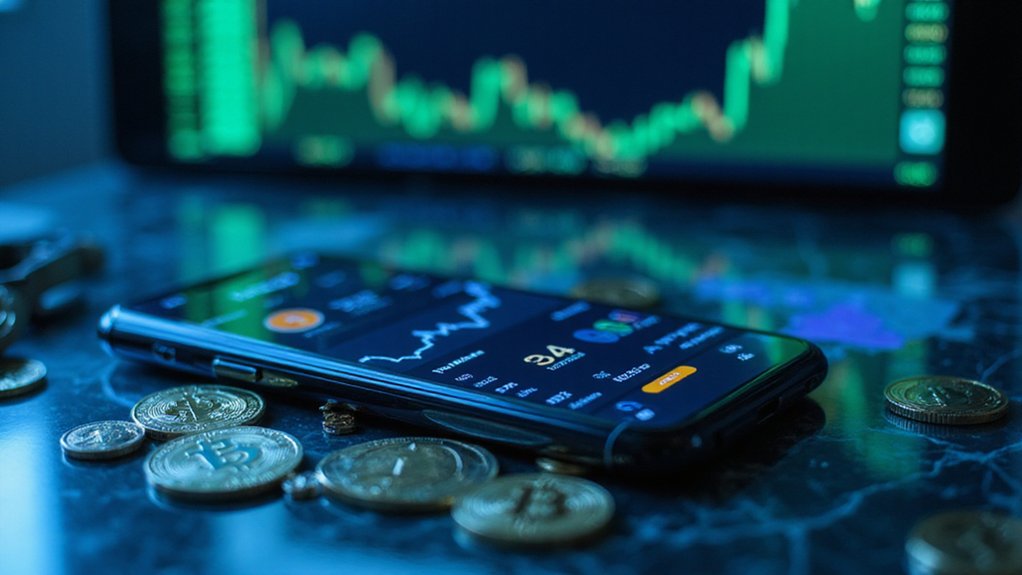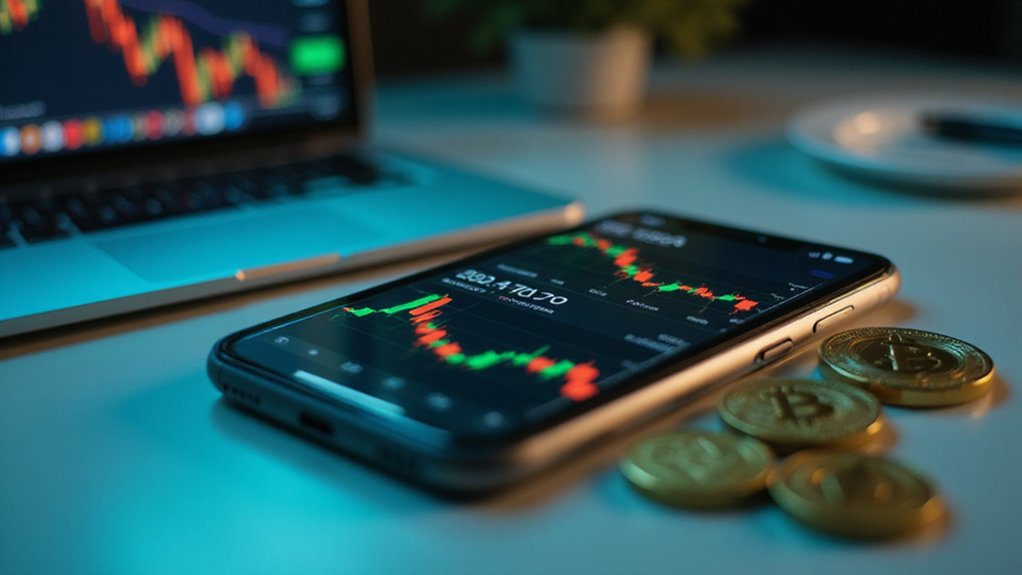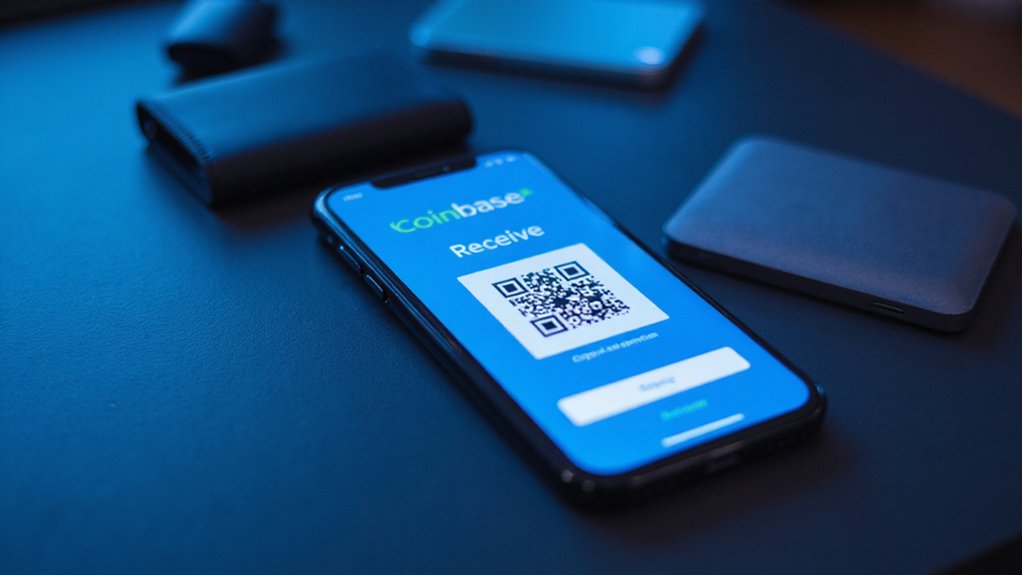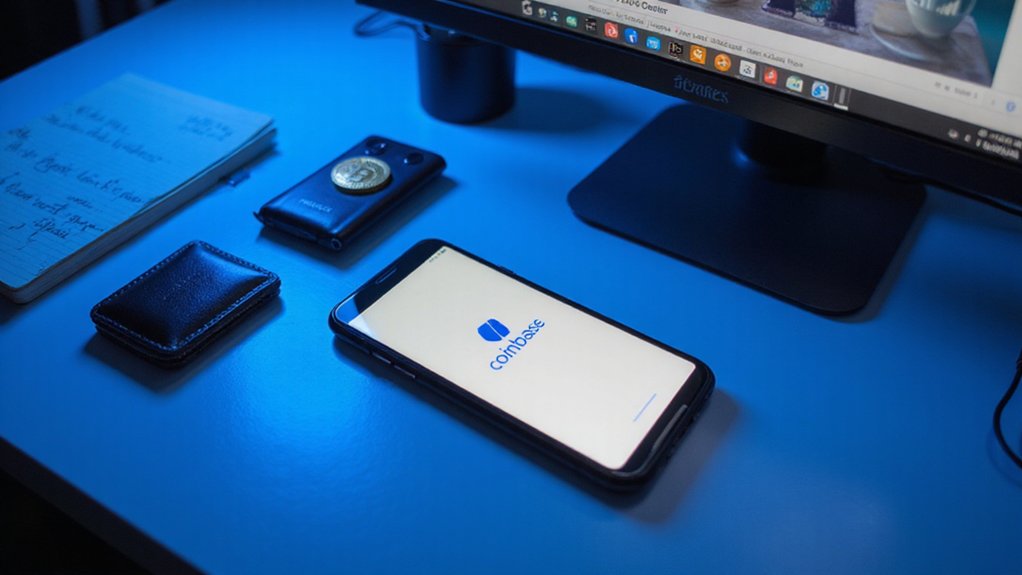Robinhood operates as a brokerage (not an exchange) for cryptocurrency trading, allowing users to buy and sell over 30 cryptocurrencies against USD only. Its commission-free model derives revenue from spreads, catering particularly to crypto novices switching from traditional securities. The platform offers varying cryptocurrency access (26 in the US, 48 in Europe) with tools like customizable charts and technical indicators. Regulatory headwinds have transformed into tailwinds, positioning the company for ventures into tokenized equities and stablecoins—the digital redistribution continues.

When did a stock trading app named after a folkloric wealth redistributor become one of cryptocurrency’s most consequential on-ramps?
Robinhood’s digital metamorphosis mirrors its legendary namesake—redistributing financial access rather than medieval wealth.
Robinhood’s transformation from equities upstart to crypto juggernaut has been nothing short of remarkable, with cryptocurrency transaction revenues doubling year-over-year to $252 million in Q1 2025—now constituting a staggering 43% of the platform’s total transaction revenue.
This ascendancy reflects both strategic foresight and fortuitous timing as regulatory headwinds have unexpectedly shifted to tailwinds.
The platform’s approach to cryptocurrency trading is distinctly brokerage-oriented rather than exchange-based.
Users can trade over 30 cryptocurrencies—including market stalwarts Bitcoin and Ethereum alongside retail darlings like Dogecoin—exclusively against USD, with no crypto-to-crypto trading functionality.
This limitation, while potentially frustrating for seasoned crypto traders accustomed to token swaps, simplifies the experience for newcomers shifting from traditional securities.
Robinhood’s signature commission-free model extends to its crypto offerings, though the spread between buy and sell prices constitutes the platform’s de facto revenue mechanism¹.
Advanced traders benefit from Robinhood Legend, a desktop platform offering customizable layouts with up to eight simultaneous charts adorned with technical indicators from moving averages to Bollinger Bands.
The recent addition of futures trading, including Bitcoin futures, signals the platform’s ambition to transcend its beginner-friendly reputation.
Meanwhile, the planned acquisition of Bitstamp—a venerable institution in crypto terms—telegraphs Robinhood’s global aspirations and desire to service institutional clients alongside retail traders.
Trading volumes have reached impressive heights ($46 billion in Q1 2025), though quarter-over-quarter volatility remains substantial. Crypto trading volume surged dramatically to $71 billion in Q4, reflecting the platform’s growing dominance in the digital asset space.
The expanding cryptocurrency selection (now 26 in the US and 48 in Europe) demonstrates Robinhood’s commitment to extensive offerings.
With technology innovation at the forefront, the platform has introduced Robinhood Cortex, an AI-powered investment assistant expected to roll out later in 2025.
Currently, Robinhood Crypto offers access to 19 popular cryptocurrencies including Shiba Inu (SHIB) and Solana (SOL), though availability varies by state due to regulatory differences.
With the SEC investigation concluded without enforcement action, the platform is poised to venture into tokenized equities and stablecoins—potentially revolutionary products that blur the increasingly arbitrary distinction between traditional and crypto finance.
The wealth redistributor, it seems, has found its digital quiver.
¹Robinhood’s “free” trading is, of course, as mythical as its namesake.
Frequently Asked Questions
Is Robinhood Crypto Trading Available in All States?
Robinhood Crypto’s availability presents a patchwork of regulatory compliance across America.
While technically accessible in all 50 states plus DC, the regulatory landscape creates notable disparities in service offerings.
New Yorkers, for instance, can trade cryptocurrencies but cannot transfer them—a curiously half-baked implementation.
The platform has extended its reach to US territories like Puerto Rico and the Virgin Islands, where transfers are permitted, reflecting the complex regulatory tapestry governing digital assets nationwide.
Can I Transfer My Crypto to External Wallets?
Yes, Robinhood allows users to transfer cryptocurrencies to external wallets.
The platform supports transfers across multiple networks including Bitcoin, Ethereum, Solana, and others.
This functionality enables access to DeFi protocols, dApps, and enhanced security options through self-custody solutions like hardware wallets.
The process involves selecting the cryptocurrency, entering the recipient wallet address, verifying details, and confirming the transaction—standard procedure for safeguarding digital assets in an ecosystem where ownership verification remains paramount.
What Are Robinhood’s Cryptocurrency Trading Fees?
Robinhood’s cryptocurrency trading model eschews traditional commission fees—a innovative departure from industry norms—yet incorporates costs through spread-based pricing, averaging approximately 0.55% per transaction.
This fee structure remains consistent across buying and selling activities, with no additional hidden charges to ambush the unwary trader.
Importantly, deposits via debit cards incur zero fees, and users can initiate investments with as little as $1—making cryptocurrency accessibility, if not guaranteed profitability, remarkably democratic.
Does Robinhood Offer Staking Rewards for Cryptocurrencies?
Yes, Robinhood offers cryptocurrency staking rewards through their platform.
Users can earn passive income by locking up eligible tokens (currently including assets like ATOM, ETH, and AVAX) to help secure their respective networks.
The reward rates—expressed as APY—fluctuate with market conditions and are paid after deducting both staking partner fees and Robinhood’s own cut.
Rewards automatically accumulate in users’ accounts, though availability remains subject to regional regulations and minimum holding requirements.
How Quickly Can I Access Funds After Selling Crypto?
After selling crypto on Robinhood, fund accessibility depends on one’s patience—or lack thereof.
Standard ACH transfers (free, but requiring the fortitude to wait up to five business days) stand in stark contrast to instant withdrawals (available for the impatient at a 1.75% fee for debit card transfers).
Unlike the settlement purgatory of equities trading, crypto-to-fiat conversions occur immediately, though withdrawal mechanisms still impose their temporal constraints.
Daily limits apply, resetting at 7 p.m. EST.









